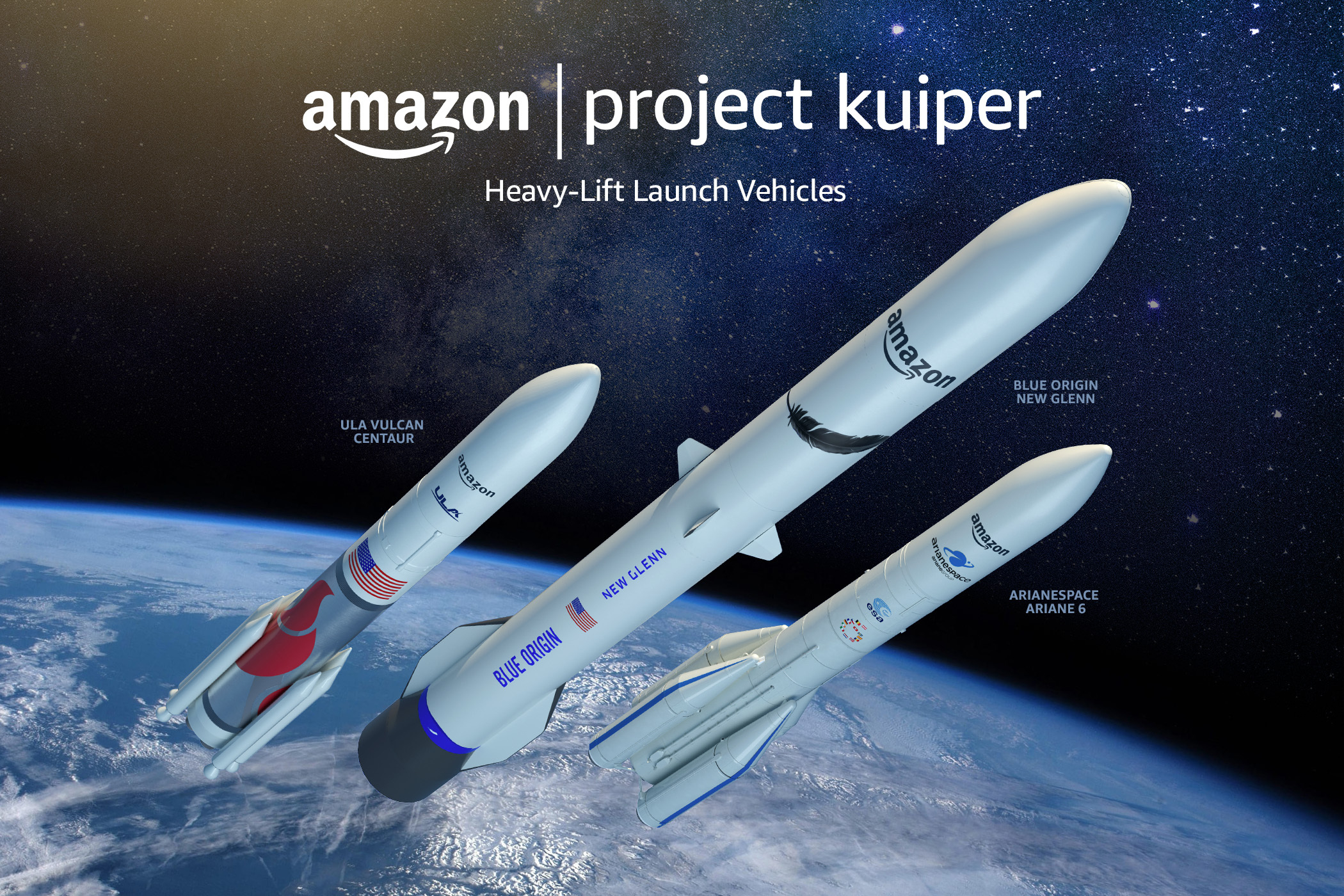
Amazon has booked rides to space for the majority of its internet-satellite megaconstellation.
The company announced today (April 5) that it has signed contracts for up to 83 launches, which will loft the bulk of Amazon's 3,236 "Project Kuiper" internet satellites. The package of deals is "the largest commercial procurement of launch vehicles in history," company representatives said in a statement.
Amazon has secured 18 launches of Arianespace's Ariane 6 rocket, 38 flights of United Launch Alliance's (ULA) Vulcan Centaur and 12 missions (plus an option for 25 more) of Blue Origin's New Glenn heavy lifter. (Blue Origin and Amazon were both founded by Jeff Bezos, the world's second-richest person.)
Related: What is a satellite?
Amazon did not disclose the value of any of the contracts.
"We still have lots of work ahead, but the team has continued to hit milestone after milestone across every aspect of our satellite system," Dave Limp, senior vice president for Amazon Devices and Services, said in the same statement. "These launch agreements reflect our incredible commitment and belief in Project Kuiper, and we’re proud to be working with such an impressive lineup of partners to deliver on our mission."
Notably, those partners do not include SpaceX, whose Starlink broadband constellation is already providing service to customers around the world. SpaceX has launched more than 2,300 Starlink satellites to date using its workhorse Falcon 9 rocket and could end up lofting about 30,000 more.
Get the Space.com Newsletter
Breaking space news, the latest updates on rocket launches, skywatching events and more!
Unlike the Falcon 9, the rockets that Amazon just picked to launch the Project Kuiper satellites aren't yet up and running. The Ariane 6 and Vulcan Centaur are expected to debut later this year, Arianespace and ULA representatives have said. New Glenn's first launch likely won't occur before 2023.
It's unclear why SpaceX didn't receive a Project Kuiper launch contract. But, as Ars Technica's Eric Berger noted, it likely didn't boil to competitive instinct on SpaceX's part; Elon Musk's company recently signed on to launch OneWeb internet satellites that were originally supposed to fly on Russian-built Soyuz rockets. (OneWeb's Soyuz deal with Arianespace, which was operating the rockets, fell apart after Russia invaded Ukraine.)
Amazon plans to launch two Project Kuiper prototype craft later this year on ABL Space Systems' RS1 rocket. Amazon also holds a pre-existing Project Kuiper deal for nine launches on ULA's Atlas V.
Mike Wall is the author of "Out There" (Grand Central Publishing, 2018; illustrated by Karl Tate), a book about the search for alien life. Follow him on Twitter @michaeldwall. Follow us on Twitter @Spacedotcom or on Facebook.
Join our Space Forums to keep talking space on the latest missions, night sky and more! And if you have a news tip, correction or comment, let us know at: community@space.com.

Michael Wall is a Senior Space Writer with Space.com and joined the team in 2010. He primarily covers exoplanets, spaceflight and military space, but has been known to dabble in the space art beat. His book about the search for alien life, "Out There," was published on Nov. 13, 2018. Before becoming a science writer, Michael worked as a herpetologist and wildlife biologist. He has a Ph.D. in evolutionary biology from the University of Sydney, Australia, a bachelor's degree from the University of Arizona, and a graduate certificate in science writing from the University of California, Santa Cruz. To find out what his latest project is, you can follow Michael on Twitter.









